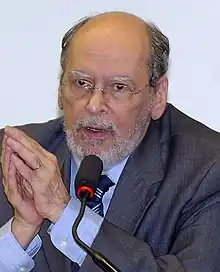Sepúlveda Pertence | |
|---|---|
 Pertence in 2008 | |
| President of the Superior Electoral Court | |
| In office 20 November 2003 – 21 February 2005 | |
| Preceded by | Nelson Jobim |
| Succeeded by | Carlos Velloso |
| In office 15 June 1993 – 22 November 1994 | |
| Preceded by | Paulo Brossard |
| Succeeded by | Carlos Velloso |
| Prosecutor General of the Republic of Brazil | |
| In office 15 March 1985 – 17 May 1989 | |
| Preceded by | Inocêncio Mártires Coelho |
| Succeeded by | Aristides Junqueira |
| Personal details | |
| Born | José Paulo Sepúlveda Pertence 21 November 1937 Sabará, Minas Gerais, Brazil |
| Died | 2 July 2023 (aged 85) Brasília, Brazil |
| Education | Federal University of Minas Gerais |
| Occupation | Jurist Politician |
José Paulo Sepúlveda Pertence (Sabará, November 21, 1937 – Brasília, July 2, 2023) was a Brazilian jurist, magistrate, lawyer, and professor. He served as the Chief Justice of the Supreme Federal Court from 1995 to 1997, where he also worked as a Justice from 1989 to 2007. He was a Minister of the Superior Electoral Court from 1990 to 1994 and from 1999 to 2005, having presided over the court twice, during the biennia of 1993/1994 and 2003 to 2005. He was the Attorney General of the Republic from 1985 to 1989; Vice-President of the Brazilian Bar Association from 1977 to 1981; Vice-President of the National Union of Students from 1959 to 1960, and President of the Commission of Public Ethics of the Presidency of the Republic from 2007 to 2012. He was an Assistant Professor at the University of Brasília from 1962 to 1965.
After the military coup in Brazil in 1964, Sepúlveda Pertence, who, according to a secret report from the Ministry of War dated 1965, "advocated reformist ideas that did not align with the spirit of the Revolution,"[1] was dismissed from his position as a Professor at the University of Brasília in the same year[2]. In October 1969, he was retired from the Public Ministry due to Institutional Act No. 5, which, from 1968 on, intensified the arbitrary powers of the military regime. During the period of the military regime, he practiced law alongside Victor Nunes Leal, who had been removed from his position as a Justice of the Supreme Court also due to Institutional Act No. 5. During the same period, Sepulveda Pertence assumed the vice-presidency of the Brazilian Bar Association from 1997 to 1981. During this period, he defended Luiz Inacio Lula da Silva for the first time in a case related to a National Security crime charge stemming from a strike led by Lula. After the end of the authoritarian regime, Sepulveda Pertence was appointed as the Attorney General of the Republic in 1985. He became a member of the Provisional Commission for Constitutional Studies (Afonso Arinos Commission), which preceded the drafting of the new Brazilian constitution. He served as the rapporteur for the sections related to the Judiciary and the Public Ministry and was a member of the Final Systematization Commission. In this role, he wielded decisive influence in shaping the institutional framework of the Public Ministry in the 1988 Constitution, resulting in its autonomy from the Executive Branch. He left the position of Attorney General when he was appointed as a Justice of the Supreme Federal Court in 1989. During his presidency at the Superior Electoral Court, he ensured the right to vote for young people who turned 16 before the elections and enabled the creation of the database for the implementation of electronic voting in the following years after 1994. After retiring from the Supreme Federal Court, Sepulveda Pertence briefly joined the team of defense lawyers for former President Luiz Inacio da Silva in 2018. At that time, President Silva was a defendant in a criminal case accusing him of corruption. According to Chief Justice Luis Roberto Barroso, "Few Justices have been as influential in defining the institutional profile and shaping the jurisprudence of the STF since its inception." Justice Luiz Edson Fachin asserts that Sepulveda Pertence "established a lexicon in contemporary constitutional interpretation."
[1] https://veja.abril.com.br/politica/regime-militar-fez-75-relatorios-de-inteligencia-sobre-sepulveda-pertence#:~:text=Foi%20presidente%20do%20Supremo%20de,todo%20o%20per%C3%ADodo%20da%20ditadura
[2] Fernando de Castro Fontainha, Angela Moreira Domingues da Silva, Izabel Saenger Nuñez (orgs.) História oral do Supremo (1988-2013), v.3: Sepúlveda Pertence, / Escola de Direito do Rio de Janeiro da Fundação Getulio Vargas. - Rio de Janeiro : Escola de Direito do Rio de Janeiro da Fundação Getulio Vargas, 2015
[1] In the Supreme Federal Court of Brazil, the presidency and vice-presidency are held for a two-year term by the Court’s members, who are elected to these roles based on their longevity at the Court.
.[1]
Sepúlveda died of multiple organ failure in Brasília on 2 July 2023, at the age of 85.[2]
References
- ↑ "José Paulo Sepúlveda Pertence". Supreme Federal Court (in Portuguese). Archived from the original on 15 February 2018. Retrieved 3 July 2023.
- ↑ Serra, Paolo; Turollo Jr., Reynaldo; Marzullo, Luíza (2 July 2023). "Morre em Brasília o ex-ministro do STF Sepúlveda Pertence". O Globo (in Portuguese). Retrieved 3 July 2023.